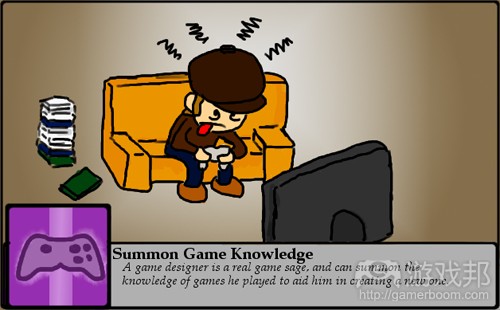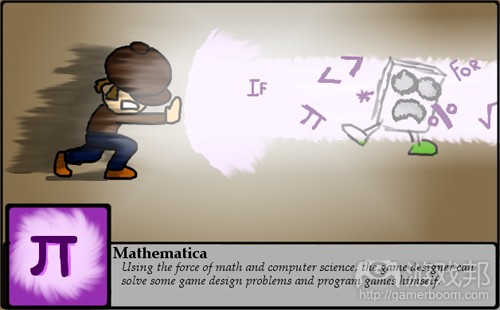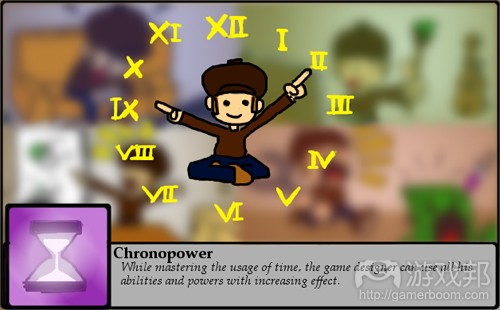阐述游戏设计师所扮演角色之技能篇(3)
作者:Adriaan Jansen
今天我们将主要讨论游戏设计师所需要掌握的技能。我所说的技能是我们通过在学校学习,阅读书籍或分析事物能够学习到的内容。我认为不同人有必要根据自己所选择的游戏类型而学习不同的技能。就像《文明》系列的设计师必须深入了解各种历史知识才能有效地呈现出时代变迁感;而《质量效应》的设计师就不需要这么做。但是不管怎样,至少有一点是明确的:这个世界充满各种信息与可能性,能够帮助你通过各种视角看待不同事物并经历各种体验。如果你的视野越宽广,阅历越丰富,你便能够获得更加有趣的想法和经历。满满的求知欲能够帮助你制作出真正优秀的游戏!总的来说,我的意思是你需要“尝试任何事物!”但是考虑到可行度,我将只列出3大最有帮助的内容。(请点击此处阅读本系列第1、2部分)
游戏知识
你知道这一行的前辈常说的一句话是什么吗——游戏开发与玩游戏一点关系都没有!但是这却是最大的谎言啊!这是你的对手们为了防止你这名优秀的游戏玩家超越他们而使用的手段。那么真相到底是什么呢?是否制作游戏与玩游戏具有深刻的联系?如果你曾经尝试过各种不同的游戏,你便会发现游戏中存在各种不同的机制。这时你便会好奇游戏是如何运作的?为何有些游戏具有乐趣,有些游戏却很无趣?游戏的主题是什么?其它游戏内容是如何支持这一主题?还有哪些内容需要提高?如果你喜欢玩那些时间段较长的游戏,如大型多人在线角色扮演游戏或竞技游戏,你就需要学会保持游戏的平衡。尝试各种游戏并学会分析它们能够帮助你更好地解决自己在游戏中所遇到的问题。如果你正在制作一款与现有游戏类似的游戏,你便可以有效地避开现有游戏所遇到过的陷阱;如果你现在所面临的问题已经被其它游戏所解决了,你就无需自己再趟一次浑水了。只要你能够重视别人的进步,你自己定能够获得更加快速且稳步的进步。
你需要记住,你为自己的游戏定位的体验可能与你玩过的游戏体验不同,所以不要只是出于喜欢而盲目地复制那些你不需要的内容,更不要复制别人的经验!就好比《魔兽世界》吧,这是一款极具名气的游戏,其开发者拥有游戏开发经验并且也享有优越的开发时机(如果他们遗漏了其中一点优势,特别是名声,那就真的只能说明他们拥有绝对强大的商招)。你需要好好分解任何一款你所玩过的游戏,修改并使用游戏中的解决方法使之适合自己的游戏。每个人都在这么做(游戏邦注:就像现在大家都在使用方向键机制一样),你又何必“拘谨”。
数学和计算机科学
你是否希望得到团队中的开发者的青睐?那就努力学习数学和计算机科学吧!数学将帮助你更好应对游戏开发中的众多难题,因为大多数游戏都需要牵扯到经济,而经济中的某些内容又是以数学形式呈现出来。角色扮演游戏和策略游戏最为明显。任何游戏都拥有自己的均衡点以及特定的数学模式,它们的开发团队也知道如何基于这些内容去加速自己的开发过程。除此之外,机会也是不容忽视的一点,它是游戏中一大基本内容。机会就像是一种纯粹的数学魔法,正因为我们喜欢魔法,所以我们便选择使用它。掌握了数学的基本原理你便能够快速且轻松地创造出平衡的游戏。数学原理同样也能够有效地帮助你进行编程。
了解如何编写脚本和程序对于设计师来说很有帮助。这样你便能够较容易地修改任何内容,并进一步明确游戏中的任何发展潜能。同时,这也能够缓解程序员的压力避免他们花费更多时间去解释事情的发展,并让你不会觉得自己像个傻瓜似的。同时你也需要记得,清楚自己团队的工作事项能够帮助你更好地进行定位与讨论。就像你需要知晓团队中的开发者在做些什么,如此才能够加速你的修改过程并推动你们之间进行更好的交流——这是游戏设计师工作中最重要的两大内容。
数学和计算机科学是这个列表中最不重要的一点内容。所以你大可不必因为自己糟糕的数学而沮丧。而我之所以提及这一点是因为:如果你知道如何编写脚本或程序,你就不能以“啊,但是我不知道如何编写计算机程序”为自己找借口了。这是任何有抱负的游戏开发者最不能容忍的一点。
1万个小时
你也许知道这是Malcolm Gladwell所提出的理论(游戏邦注:即1万小时成功理论):花费1万小时去实践某件事,你便能够成为这个领域的专家。我并不想在此详细讨论这一理论,只是想证明,它完全适用于游戏设计。游戏设计是一个广泛的领域,伴随着人们所创造或经历过的体验而不断发展;并且人们需要在此面对各种观点,问题以及人员。所以不存在任何能够帮助你“半路出家”的理论。我知道,“实践”并不属于一种技能,但是游戏设计又太过广泛,所以仅依靠3种技能还不足以帮助你征服这一领域。
所以你需要继续创造游戏!创造更多游戏。创造各种不同类型的游戏。如果你不知道如何创造游戏图像或编写程序,你就需要先学会这些基本技能或先尝试着制作一款桌面/纸牌游戏。你将能快速了解到机制样式,设计陷阱,以及各种你需要与之交流的人。除此之外你也能够学习到那些对你所选择的游戏类型有帮助的技能(也许是生物学或历史等知识);并且你将更加明确哪些技能能够真正推动自己游戏设计的不断进步。
(本文为游戏邦/gamerboom.com编译,拒绝任何不保留版权的转载,如需转载请联系:游戏邦)
The Game Designer Class – What skills does he use?
by Adriaan Jansen
A few weeks ago, I started with a series of blogposts about what it’s like and what it takes to be a game designer. Because we’re talking games here, I’m approaching these posts as an RPG character creation guide. The series consists of the following chapters:
1.Role: What are the tasks of a game designer?
2.Passive Abilities: What are favorable character traits?
3.Powers: What are important skills? (This chapter!)
4.Weaknesses: What are the biggest pitfalls?
This week’s subject is about skills. When I talk about skills I mean things that you can learn and develop by going to school, reading books, analyzing stuff etc. To be honest, it’s a though subject for me to talk about. The most important reason for that is that the skills you need to learn depend strongly of the kind of game you wish to make. The game designers from the Civilization series probably learned a good amount of history to enhance that feel of progressing through the ages. I don’t think that the game designer working on Mass Effect did the same. One thing, however, is certain: the world with all its information and possibilities is a massive pool of interesting perspectives and experiences. The more you see, do and learn, the more perspectives and experiences you gain. Being curious will certainly help you in making great games! Basically, I’m saying: “Do everything!”. But since that’s not feasible, I’ll just list the 3 things that I think will help you the most in general…with one side note. I think I hammered on communication enough by now, so I’m going to leave that one out. BUT IT’S THERE SO PRACTICE YOUR COMMUNICATION SKILLS!
Again, big thanks to Jesse Schell, Extra Credits and Joost van Dongen. If you want to learn a lot of game design, I recommend to start with Jesse Schell’s the art of game design. After you read this of course!
Game Knowledge
You know how often wise old man say: Game development has nothing to do with playing games! Well, that’s a lie! It’s propaganda from the elite to keep you, the fanatic gamer, from forming a competition for them! Ok, that’s not entirely true, but what is true, is that making games has a lot to do with playing games! If you have played a lot of (different) games, you are likely to have seen a lot of different mechanics. Be curious about how a game works. Why is it fun, or not fun at all? What’s the theme? How does everything reinforce that? What could be improved easily? If you like playing a more “long term” game, like an MMORPG or an arena game, try predicting the patches to get a hang of balance. Playing a lot of games, but also analyzing them, gives you the best possible pool of answers for the problems of your game. If you’re making a game that has similarities with another game, why fall for the same pitfalls? If you face a problem that is already well handled in another game, why re-invent the wheel? Progress is made faster and better, if you don’t ignore the progress others make.
Just remember that the experience you’re targeting with your game is probably different than that of the games you played. Don’t copy stuff you don’t need, and for the love of everything that is holy, don’t copy the experience! Making World of Warcraft, but better is, most of the time, just a bad idea. They have the name, they have the experience of the development and they have a good time advantage. (If they’re missing those though, especially the name, it might be a smart business move. Not very noble, but smart nonetheless) Pick apart the many games you’ve played, and use and modify their solutions to fit yours. Everyone does it (Who came up with the brilliant WASD?), and so should you.
Math & Computer Science
Want to be loved by the developers on your team? Learn some math and computer science! Math will help you in most game anyways, since most games have an economy and economies are partially mathematical models. The RPG’s and strategy games are obvious shots here. Any game that has balance in them, has a mathematical model in it, and having a good grasp on how these work will surely speed up your development progress. Another point not to forget is chance, often a fundamental part of games. Chance is pure math wizardry, but hey, we like magic so let’s use it. Knowing the basics of math will allow you to make balanced games faster and easier. So try to get a grasp on that. Math also helps with programming, which is awesome!
Because knowing how to script and program is very handy for a designer. You can tweak and change things easier and it gives more insight in the possibilities of your game. It also saves your programmer stress and time explaining how things can’t work this way and thinking what a moron you are. Remember that knowing what your team is doing is important for good pitches and discussions? Well big shock, your developer actually programs! Knowing how his job works speeds up the tweak loop, and betters communication, two big parts of the game designer’s life.
Now math & computer science are arguably the “least important” of the 3 things I’m listing here as most useful in general. Don’t get discouraged if you’re a disaster at math. But I mention it for one important reason: If you know some scripting or programming, you can’t pull the “eeeeh, but I don’t know how to make a computer program!”-excuse on yourself. It’s the worst thing that could happen to an aspiring game developer, because you know what’s the most important for being a game designer…?
10 000 hours
Maybe you know this rule set up by Malcolm Gladwell: Put 10 000 hours of practice in something, and you become an expert in it. I’m not going to discuss the rule in general, but for game design, it’s spot on. Game design is a vast area that keeps growing with every experience a human creates or goes through. There are so many perspectives, problems and people to work with. There is no way that studying any theory will get you even half way of using your full potential game design powers. I know, “practice” isn’t really a skill, but game design is to broad to be captured in 3 skills, so I’m going to cheat it into this list anyway!
So just make games! Make loads of them. Make any kind of them. If you can’t make art or write a program, learn their basics or go make a board/card game. You will learn patterns in mechanics, pitfalls in design and what kind of people you can communicate with quickly. You will also learn which other skills seem more useful for the type of games you want to make. Maybe it’s biology or history. You will surely get more insight in what skills are required for you to progress your game design. I don’t even know why you’re reading all this crap if you could be making a game. Go make one right now!(source:GAMASUTRA)










































 闽公网安备35020302001549号
闽公网安备35020302001549号